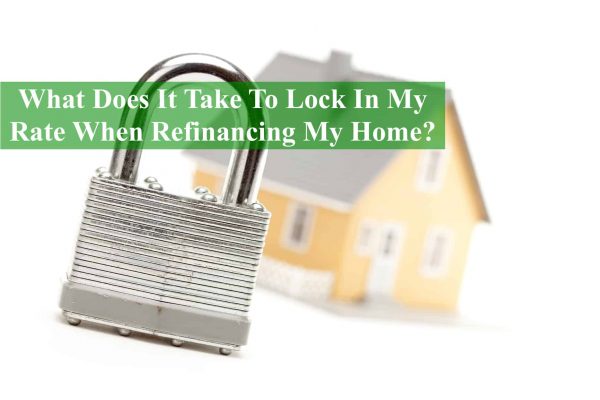No Obligation and transparency 24/7. Instantly compare live rates and costs from our network of lenders across the country. Real-time accurate rates and closing costs for a variety of loan programs custom to your specific situation.

You already own a home, but you heard that mortgage rates are great right now and you want to refinance to take advantage of the timing. Now you need to lock the rate so you don’t miss out if the trend turns around and goes bad. This article will explain how to do so.
Since you’re refinancing your home, you may have already locked in a mortgage rate before. If you already know the basics of locking a loan but need a few extra specifics about refinancing rate locks, scroll down to that section!
For the general purpose user, we assume you want to start from the very beginning, and it can never hurt to see the information over again.
When you lock in a mortgage rate, that means your interest rate will not change from the time your lender offers you the rate to the time of mortgage closing, as long as your mortgage closes within the time frame specified in your contract and nothing changes in your application.
Interest rates can change every day. If you don’t lock in the rate you’re initially offered, it might change by the time your mortgage closes. And if rates go up in the meantime, you’ll end up with a higher rate. But if you lock in your rate, it won’t change.
Rate locks are usually available for anywhere from 30 to 60 days, and sometimes even longer than that.
As mentioned, your rate lock will remain in effect if nothing changes on your mortgage application. But it can change if there are changes made to your application, including the following:
Other changes that may affect your rate lock include the following:
If you haven’t applied for a loan yet, the first thing you need to do is submit an application. Apply, get pre-qualified, and then lock in your rate. It’s that simple. Good lenders can get you locked in the same day you submit an application, provided it is not submitted at the end of the day.
You’ll still have to provide the same proof of income and assets; however, that can be done after your rate is locked. A credit report will have to be pulled prior to locking a rate as your credit score is the biggest factor in determining what rate you will qualify for. On the bright side, you’ll know what to expect, having financed a home before.
In fact, the application process is easier on a refinance given you don’t have to deal with sellers, real estate agents or bidding wars like you did when you purchased your home. You’ll already have a proven record of paying your mortgage, and you’ll probably know what kind of payment you’re looking for in the future as well.
When considering a refinance make sure you consider the total closing costs associated with the loan including all lender and third-party fees. It’s not enough to simply scan the internet or call a lender for their lowest rate.
It is just as important to know the associated costs with a particular rate. The lower the rate the higher the costs and vice versa. Make sure you are considering all options including low or no cost options when refinancing.
Once you’ve decided on the right program, rate and cost structure, get your rate locked if there is a sizable benefit over your current situation. Make sure you’re going to be happy with the program for which you locked in your rate. If general rates jump higher and you’re locked into a rate for a program you’ve changed your mind about, you’ll be in a difficult position.
Once you know what type of rate you want, lock it in. Mortgage rates tend to go down slowly and increase. If you are getting a nice benefit from current rates, don’t risk rates unexpectedly jumping higher. If they drop significantly, most mortgage companies will find a way to renegotiate a rate between what you have locked, and the going rate at that time.
You do not need to lock a rate in order to start the refinance process; however, in most situations it is risky to go through the process while floating the rate. If rates unexpectedly pop while you are going through the process you could still be out the cost of the appraisal and any other upfront fees the mortgage company charged even if it no longer benefits you to go through with the loan.
Before you lock in your mortgage rate, consider the perks and drawbacks of doing so.
Pros:
Cons:
The first thing you should consider is what the going interest rate is today. Secondly, you should carefully consider where rates are expected to go in the near future. The goal is to lock in at the lowest rate possible.
If rates are very low today and are either expected to remain that way or go higher, it may be worth it to lock in your rate. But if rates are expected to decrease in the next few weeks, it may be worth it to hold out. However, there is no crystal ball, and expert forecasts can be wrong.
At the end of the day, it’s best to speak with a mortgage expert so you can make a more informed decision about locking in your mortgage interest rate.
If you’re curious about refinancing, Sammamish Mortgage can help. We are a local, family-owned company based in Bellevue, Washington and serve the entire state, as well as Colorado, Idaho, Oregon. We have been offering many mortgage programs with flexible loan criteria since 1992. Please contact us if you have mortgage-related questions.


Whether you’re buying a home or ready to refinance, our professionals can help.
{hours_open} - {hours_closed} Pacific
No Obligation and transparency 24/7. Instantly compare live rates and costs from our network of lenders across the country. Real-time accurate rates and closing costs for a variety of loan programs custom to your specific situation.